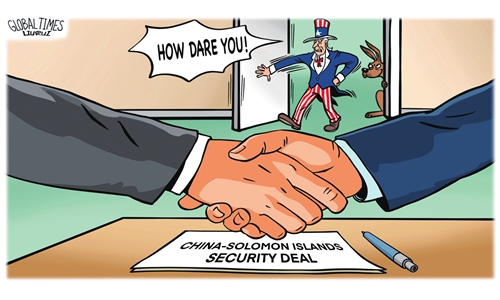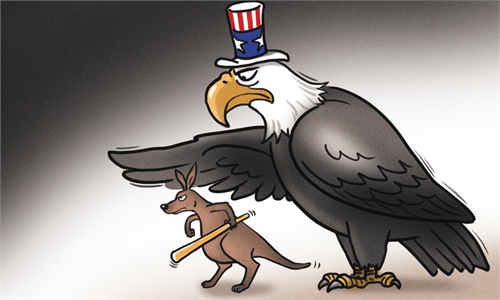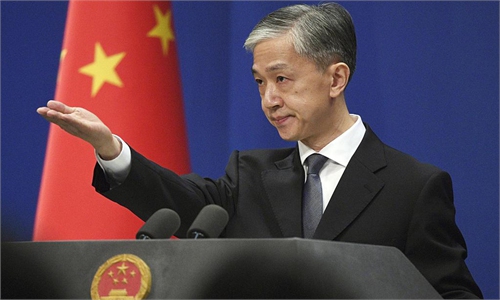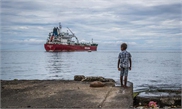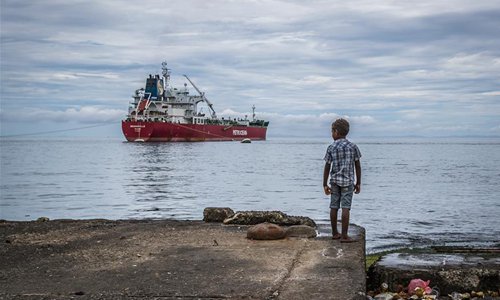
A boy watches a distant cargo ship in Honiara, Solomon Islands, October 13, 2019. File Photo: Xinhua
In the run-up to the current conflict in Ukraine, the US and its allies insisted on the "principle" that sovereign countries had the right to freely join any military alliances they chose, and their neighbors would not have veto power over that. As it very quickly turned out, that was not a principle at all, just something they made up to suit the circumstances at the moment. This was just demonstrated beyond all doubt by the US and its allies - Australia in this instance - in the case of the Solomon Islands.
Whereas Ukraine is literally right on the border with Russia, the Solomons are an island chain some 1,800 kilometers northeast of Australia. Yet the reaction from Canberra and Washington to the government in Honiara contemplating a security pact with China was far more hysterical than anything coming out of the Kremlin regarding Kiev - up until February 24, anyway.
According to documents leaked by the Australian intelligence, Beijing would be able to send police and even troops to the island nation "to assist in maintaining social order," while Chinese People's Liberation Army Navy warships could dock in the local ports - something Canberra fears would lead to China building a permanent military base there.
"We won't be having Chinese military naval bases in our region on our doorstep," Australian PM Scott Morrison said, calling such a thing a "red line" both for his government and Washington. A US envoy that visited the Solomons capital Honiara recently said that his government would have "significant concerns and respond accordingly" to any "permanent military presence, power-projection capabilities, or a military installation" by China.
David Llewellyn-Smith, an influential Australian pundit, went even further, urging Canberra to "bomb Honiara." Arguing that a Chinese military base in the Solomons would be "a clear and present threat to Australian sovereignty and freedom," Llewellyn-Smith said Australia should either "undertake to destabilise the islands politically using whatever means necessary or we openly bomb Honiara into submission."
"A smoking crater to Australia's north is not what anybody wants but it's transparently preferable to a weaponized Chinese satrap that all but ends Australian freedom," said Llewellyn-Smith.
Not once did Llewellyn-Smith or Morrison, or anyone else for that matter, explain how exactly a very hypothetical Chinese military base in the Solomon Islands would threaten Australia's freedom. After all, Canberra has demonstrated over the past several years that it's perfectly free to wall itself off from the outside world and banish anyone who "could have inspired" dissident sentiments - such as Serbian tennis champ Novak Djokovic - its own laws and rules be damned. Is this the "freedom" it seeks to impose upon the Solomon Islands by force?
Australian troops actually spent 10 years in the Solomon Islands as part of a peacekeeping mission, originally envisioned to police a deal with the Malaita separatists. The Regional Assistance Mission to the Solomon Islands (RAMSI) began in 2003 and did not officially end until 2017, though the last Australian troops officially decamped in 2013.
In 2019, the Solomon Islands established diplomatic ties with China. Independent journalist Ben Norton argued that the November 2021 unrest in Honiara, which targeted the city's Chinatown, amounted to an attempted regime change operation by the US and Australia.
Perhaps the real reason the Solomons security pact bothers Washington is that it aims "to counter US containment strategy in the Indo-Pacific," according to Anne-Marie Brady, a China scholar at New Zealand's University of Canterbury, who spoke to NBC News. This containment is, of course, aimed against China. Notice the implicit presumption that the US has every right to "contain" whomever it wants, while the targeted countries have no right to even try to counter this.
It is true that the Solomons are close to major shipping lanes linking the US and Australia, and onward to Asia. The islands drew attention for the same reason during WWII, when thousands of US troops died fighting Imperial Japan on Guadalcanal. Yet the same geopolitical explanation can be invoked regarding Ukraine, which was the site of many bitter battles between the Soviet Union and invaders led by Nazi Germany in WWII. Not to mention that Ukraine had been part of the USSR until 1991, while the Solomons did not get their independence from the UK until 1978.
Even so, the same people insisting that Honiara has no right to make a deal with Beijing argue with a straight face that Ukraine's membership in NATO would not in any way threaten Moscow. Russia, they say, has no right to object to having on its land border the same "defensive" alliance responsible for the bombing of Yugoslavia in 1999 and Libya in 2011. Meanwhile, Australia and the US - thousands of kilometers away - should invade the Solomon Islands over the pact with China?
This isn't hypocrisy, the proverbial compliment that vice pays to virtue, but hierarchy instead. In the so-called "rules-based international order" that Washington and its clients are pushing, they have sovereignty and rights, and no one else does. In their realm of moral relativism, the Solomons being a de facto Australia protectorate is freedom, while Honiara signing a security pact with Beijing somehow endangers Canberra's sovereignty. The Sovereign West can question the territorial integrity of China, but forbids the same when it comes to Ukraine.
Moreover, the US and its allies - Australia, New Zealand, Japan, South Korea and NATO - even have the nerve to call themselves "the world" or "the international community," and threaten the rest of the planet if it doesn't join their unilaterally imposed sanctions against Russia. Meanwhile, Beijing and Moscow get called "revisionist" powers because they insist on upholding the international law as written and that it be applicable to everyone evenly. One does not have to be a scholar or an expert to see the fundamental clash of two paradigms at work here, or that the world cannot move forward until this is resolved.
The author is a Serbian-American journalist. opinion@globaltimes.com.cn
